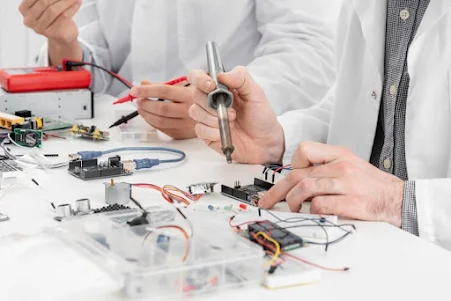An M.Sc in Physics program provides a rich tapestry of knowledge that combines core principles with specialized electives. Among the fascinating aspects of this academic journey is the evolving landscape of electronics, a field that extends beyond the core subjects to electives. Here, we will explore how core subjects interact with electives in M.Sc Physics, and trace the evolution of electronics over time.
Foundation in Core Subjects:
The M.Sc Physics curriculum lays a robust foundation in core subjects, setting the stage for an in-depth understanding of electronic principles. Mathematical Physics, Classical Mechanics, Classical Electrodynamics, Statistical Mechanics, Astrophysics, Quantum Mechanics, Condensed Matter Physics, and Atomic and Molecular Physics collectively contribute to a comprehensive knowledge base. These core subjects form the bedrock upon which the intricate edifice of electronic understanding is constructed.
Elective Exploration:
The elective subjects in electronics offer a specialized dive into key areas shaping the contemporary world of technology. Microprocessors & Microcontrollers, Optoelectronics, Communication Electronics, Electronic Instrumentation, and the Advanced Electronics Lab provide a focused exploration into the practical applications of electronic theories learned in the core subjects. This elective path allows students to tailor their academic journey to align with their specific interests within the expansive field of electronics.
From Theory to Practice:
The transition from theoretical understanding to practical application is seamlessly facilitated by the inclusion of the Advanced Electronics Lab. Here, students gain hands-on experience, applying the principles learned in both core and elective subjects. This practical exposure not only enhances comprehension but also fosters a deeper appreciation for the real-world implications of electronic theories.
Evaluation Dynamics:
The evaluation framework, comprising continuous internal evaluation and end-semester external evaluation, reflects the holistic nature of the M.Sc Physics program. Internal evaluation, based on attendance, assignments, test papers, and seminars, emphasizes the importance of consistent effort throughout the semester. External evaluation during the end-semester exams assesses the depth of understanding gained, encapsulating both core and elective subjects.
Interconnected Threads:
What makes the evolution of electronics in M.Sc Physics truly remarkable is the seamless integration of knowledge from diverse subjects. The principles learned in Quantum Mechanics, for instance, find application in Communication Electronics, creating a symbiotic relationship that enriches the learning experience.
Conclusion:
The development of electronics becomes an engaging academic adventure for M.Sc. Physics students as they progress through their studies, connecting theoretical underpinnings with practical applications. Interaction between required and elective courses shapes well-rounded physicists and prepares them for important roles in the rapidly changing field of electronics. The dynamic curriculum of the M.Sc. Physics program guarantees that graduates leave with more than just a degree; they also have a deep understanding of how electronics have evolved and are used in physics.


Comments
Post a Comment